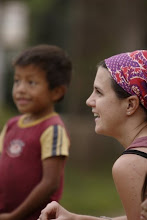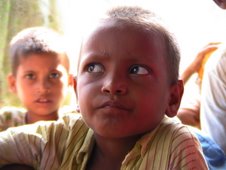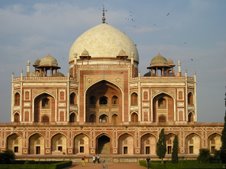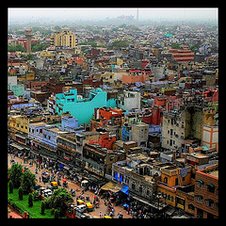1) Business is NOT all bad.
Of course, I am being a bit facetious. But I did learn that business (big, medium and small) plays an important role in international economic development. Markets play a key role for the rich as well as the poor; in fact, the poor need effective, accountable businesses so they can get the goods and services they need at the least expensive prices. Markets also tend to be more transparent than the informal systems that are devised without them. Most importantly, markets enable people to make choices, even if they seem like limited options to outsiders. People can choose how they want to sustain themselves, where they want to live and what they want to purchase. A few years ago, no one would imagine that this fisherman would want a cell phone...but he did and now he has one.
At the same time, business cannot do it alone. While pure capitalists may disagree, I believe that we need a balance of government, business and non-profits for a healthy society. Government should not run businesses but it should regulate and protect public goods, ensure a safety net and provide systems for basic services. It should also make businesses play fair. And non-profits play a key third role, pushing government and businesses to be more effective and equitable as well as providing services for those who are ignored or forgotten by everyone else. If it were so easy (and profitable) to serve the rural poor in the developing world, businesses would be doing it a lot more!
2) Leaders should listen more, talk less.
I realized time and time again this summer that I know nothing. Well, not exactly nothing but I have a lot to learn. Though I was frustrated at times, I was reminded how much you can learn by listening. By asking questions rather than relying on assumptions, you get a better understanding of an issue or dilemma. You are then better prepared to work with others to collaborately devise an innovative solution rather than get caught up on ineffective approaches.
My village visits made me realize that you have to be a great listener in order to be a great leader. I learned as much from the pioneering Drishtee women entrepreneurs as I have from any business school case study. Working in the field reminded me that organizations rely on the strengths of all their members so leaders need to get the best out of everyone around them. To do that, you have to get people to trust you. Especially when you are in an unfamiliar environment, whether it is a slum, rural village or a new office! And I found the best way to get people to trust me was to listen.
3) Think Globally, Act Globally.
We live in a global society. No community or country can act as a island (even if the country is an island!). Between trade, immigration and diplomatic relations, we are all connected. Even though we are sometimes divided by ethnic, cultural, social and/or political differences, I do believe that we can create a better world for the next generation by working together rather than against each other. Whether you are Italian or Indian (like the woman and children in this photo), you can find common ground.
In my experience in India, I have been impressed by the power of international free trade to encourage widespread economic growth and development. I have seen the positive upside of outsourcing and globalization. While I recognize that fair play is necessary to ensure the success of trade, I have seen firsthand the beneficial impact it can have on the poor.
4) Equal Rights are Empowering.
Women can play a critical role in economic development. However, we have to ensure that they are part of the process. This requires significant investment and energy in the short-run because women are not as experienced or educated as their male counterparts, especially in less advantaged populations. Organizations have to take a risk on these women to help them succeed in business. Drishtee has done a fantastic job involving women as entrepreneurs and I believe it will pay off for the organization in the long run. To increase female participation in the formal market economy, however, we also have to address the existing gender-related barriers. Laws are needed to protect equal rights and criminalize discrimination and domestic violence. Like this girl and boy, all children must have equitable education opportunities and child care issues must be considered.
5) You Gotta Have Hope.
I read an article this summer about a global survey that asked people what they thought about the future. I can’t remember the exact numbers but people in
















1 comment:
Really nice post.
I have become a fan of your writing, the way you describe the situations in a positive way is really appealing.
The optimistic view in India is just amazing, when I visit my village once in an year, it's really a great feeling.
Farmers in village keep working in a joyful fashion. Sometimes I think- Are they happy with an income less then one fourth of mine in Bangalore?
The answer comes as- yes, ultimately we can change government whenever we want. And that's the optimism about the future.
Keep writing.
Post a Comment